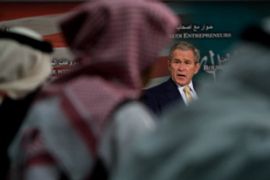Bush complains over oil prices
US president urges Opec to take corrective measures during visit to Saudi Arabia.

Opec officials have said the group’s ability to lower oil prices was limited.
According to Abdullah al-Badri, the secretary-general of Opec, oil output may be raised at meetings on February 1 and March 5.
Al-Badri said that supply was sufficient for now, and attributed rising prices to speculation.
Saudi arms deal
Meanwhile, Bush has said he intends to go ahead with a $20bn arms deal to Saudi Arabia.
|
Your Views |
|
“I fear that President Bush’s visit will be no more than a Public Relations Stunt to bolster the shaky Ehud Olmert’s government” |
The announcement begins a 30-day review period in which congress could try to block the deal, which includes satellite-guided weaponry and high-tech munitions.
Rob Reynolds, reporting for Al Jazeera from Riyadh, said the deal was likely to provoke controversy in congress.
“The US congress needs to approve this arms deal – that’s US law.”
 |
| Bush intends to garner support for US stance towards Iran [AFP] |
A senior US official said Bush would also use his trip to court Riyadh’s diplomatic influence and financial muscle which “could make an enormous difference in places like the Palestinian territories, Lebanon, Iraq, Afghanistan and other locations”.
